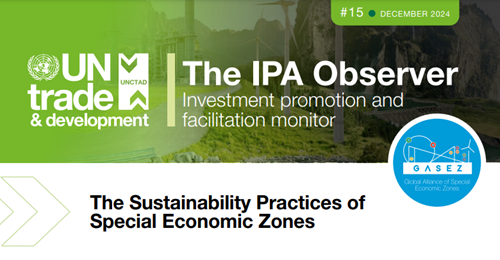SEZ and other innovation spaces contributing to sustainability
/UNCTAD_SDGs.PNG)
A growing number of governments are using Special Economic Zones (SEZs) from around the world as a policy tool to catalyse sustainable development. The Global Alliance of Special Economic Zones (GASEZ) - of which IASP is a founding member - identified 50 "SDG Model Zones" for their commitment to sustainability, and with whom Gasez is building a collaborative network. An UNCTAD report based on a survey of these SDG Model Zone Partners has recently been published.
UNCTAD (also a founding member of GASEZ) has been working to accelerate SEZs’ contribution to the UN Sustainable Development Goals. This includes supporting them to align their strategies and practices to sustainability drivers, including the Paris 2050 climate goals, increased foreign direct investment in green technologies, and investors’ growing focus on sustainability to mitigate risk, ensure long-term returns and meet consumer demand for more responsible business practices. Add to that the rise of sustainability standards and regulatory measures (such as the Carbon Border Adjustment Mechanism) and it’s clear that SEZs must adapt, or risk being left behind.
The results from the survey show that many are leveraging cutting-edge technology to monitor and improve tenants’ sustainability outcomes and support the zones’ operations, such as artificial intelligence to keep track of energy production and consumption, and manage waste. They also offer spaces where companies can experiment with new sustainability technologies and practices, and governments can ‘pilot’ innovative policy measures from sustainable urban design to sustainability-linked incentives.
SEZs are expanding their focus beyond traditional economic goals and include sustainability objectives, often in line with country-level sustainable development plans, including net-zero goals and nationally determined contributions (NDCs). The most cited sustainability objectives by respondents include promoting urban and environmental sustainability, adopting circular economy models, fostering education and innovation, and promoting diversity and inclusion.
For the full report on the Sustainability practices of SEZs see here and for any organisation interested in being named an "SDG Model Zone" the call is still open - apply here.
/)


/canvascolor(0xffffffff)/photo_2023-11-04_12-18-10_1.jpg)
/canvascolor(0xffffffff)/Logo_PEGUlm_neu.jpg)
/canvascolor(0xffffffff)/DSP_logotyp_svart_png.png)
/canvascolor(0xffffffff)/2017_08_04_fundecyt-pctex-h.png)
/canvascolor(0xffffffff)/2023_10_26_Canada_Innovation_Saskatchewan.png)
/canvascolor(0xffffffff)/logotecnopole_alta_resolucion_1.jpg)
/canvascolor(0xffffffff)/2021_01_26_Spain_PCT_Gipuzkoa.png)
/canvascolor(0xffffffff)/HiRes_logo_transparent.png)
/canvascolor(0xffffffff)/atap_logo.png)
/canvascolor(0xffffffff)/buildings2.png)
/canvascolor(0xffffffff)/MemberLogo-66501-332901.png)
/canvascolor(0xffffffff)/2018_01_24_Italy_Kilometro_Rosso.png)
/canvascolor(0xffffffff)/2023_10_09_Brazil_PCT_UNICAMP.jpg)
/canvascolor(0xffffffff)/MemberLogo-5775-6238.jpg)
/canvascolor(0xffffffff)/2017_11_15_Slovekia_CEPIT.jpg)
/canvascolor(0xffffffff)/Yothi_Medical_Innovation_Disctrict.jpg)
/canvascolor(0xffffffff)/rs_ystp-logo-en-high-02.png)
/canvascolor(0xffffffff)/2019_10_04_Poland_Poznan_Science_and_Technolog.png)
/canvascolor(0xffffffff)/2017_07_31_Konza_Technopolis.png)
/canvascolor(0xffffffff)/ppnt_logo_EN.png)
/canvascolor(0xffffffff)/Phien_ban_day_du___dang_dung_(1)jpg_Page1_1.jpg)
/canvascolor(0xffffffff)/2024_05_08_Edmonton_Research_Park_Logo.png)
/canvascolor(0xffffffff)/2024_09_26_Thailand_Northeastern_2.jpg)
/canvascolor(0xffffffff)/New_Logo_sapiens_(1)_page-0001.jpg)
/canvascolor(0xffffffff)/2024_02_20_China_Leaguer_Lishui_Accelerator.jpg)
